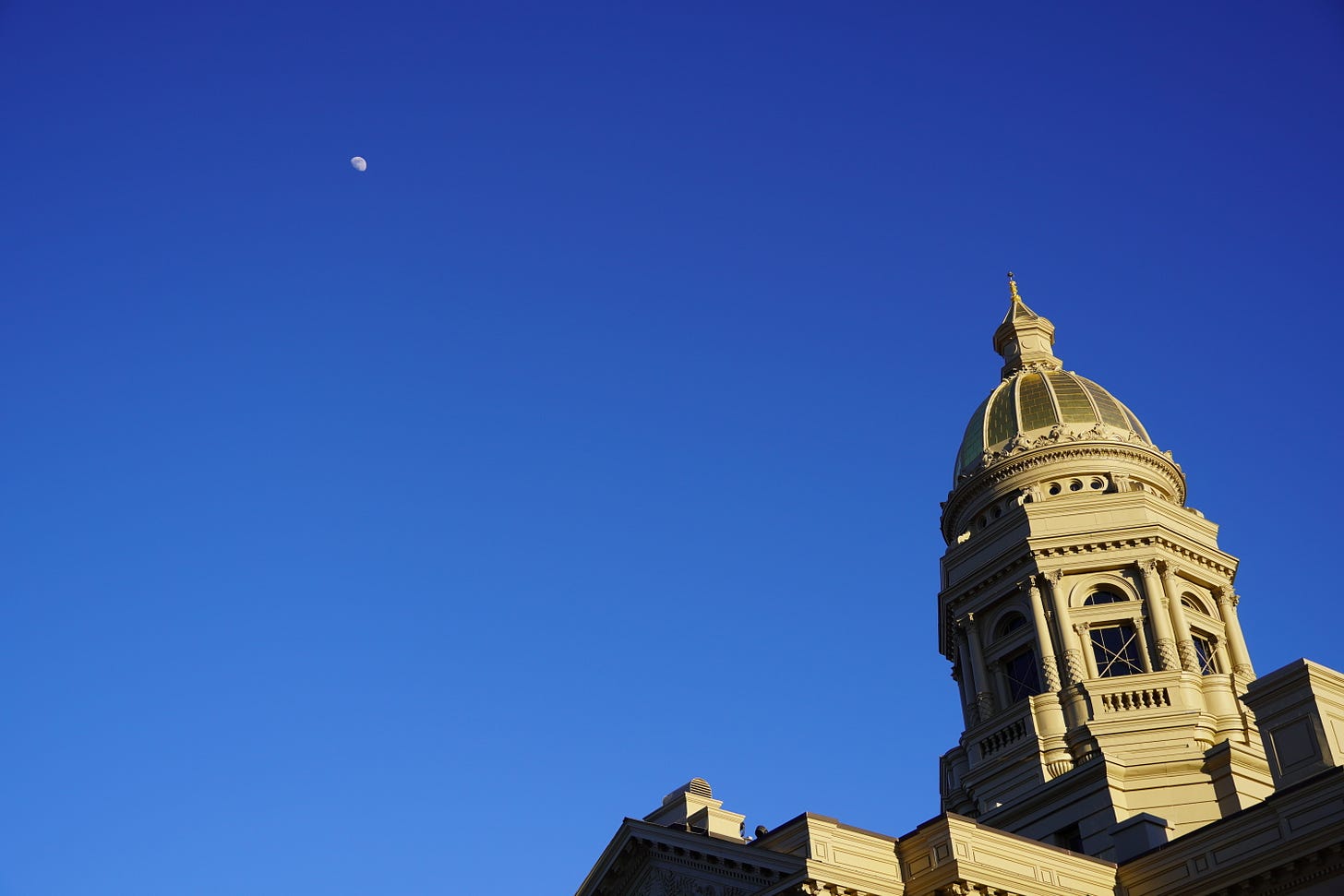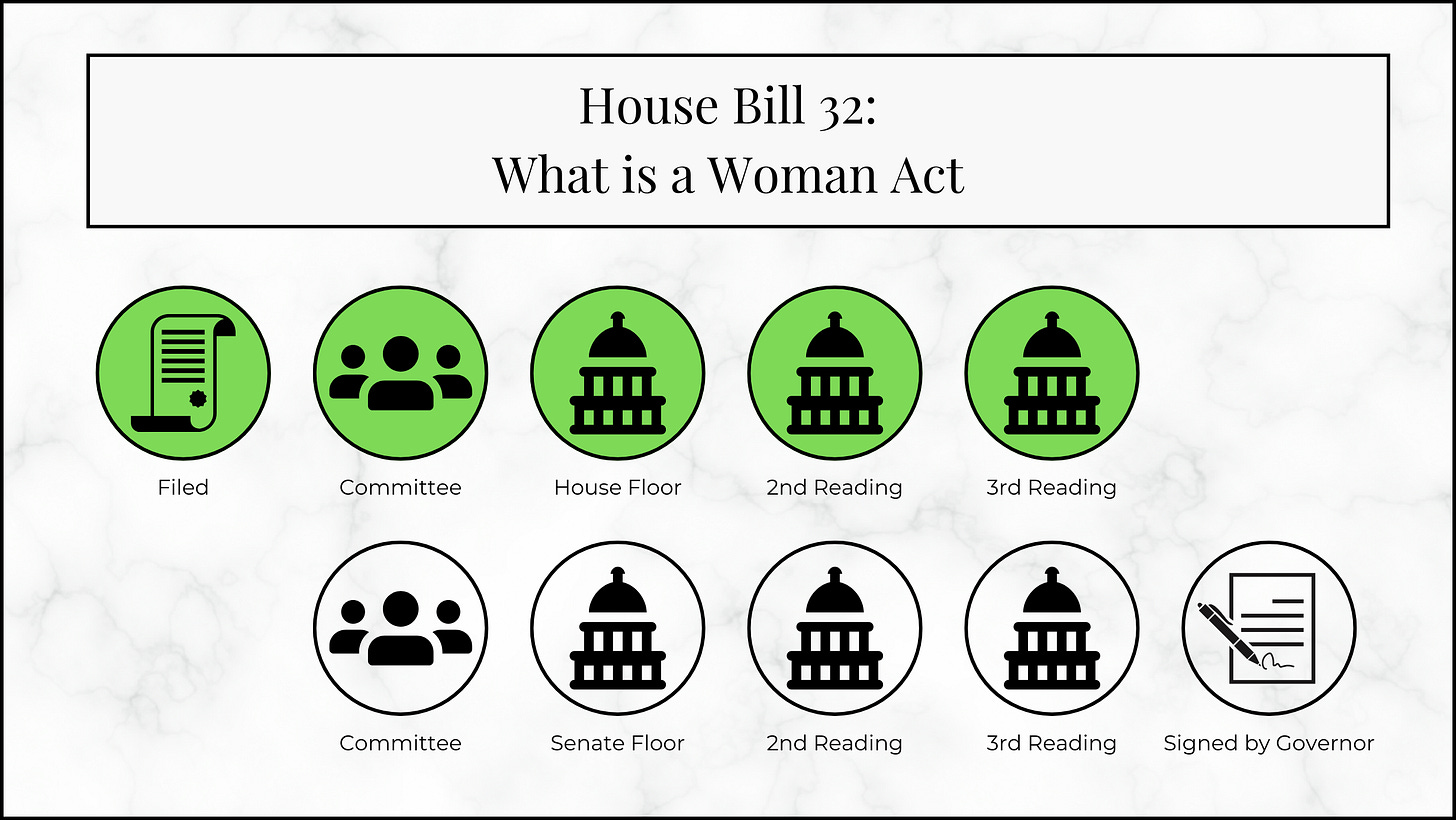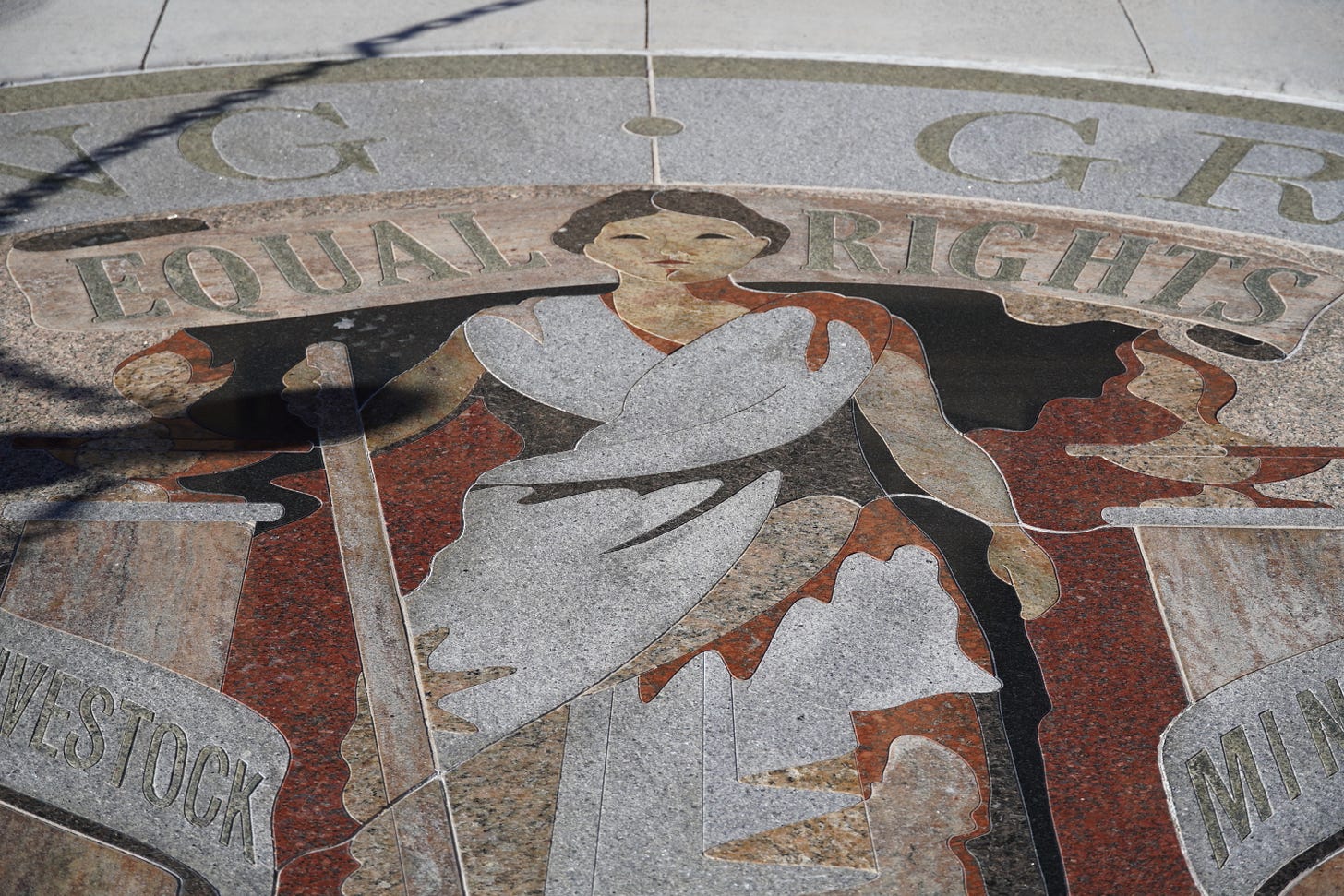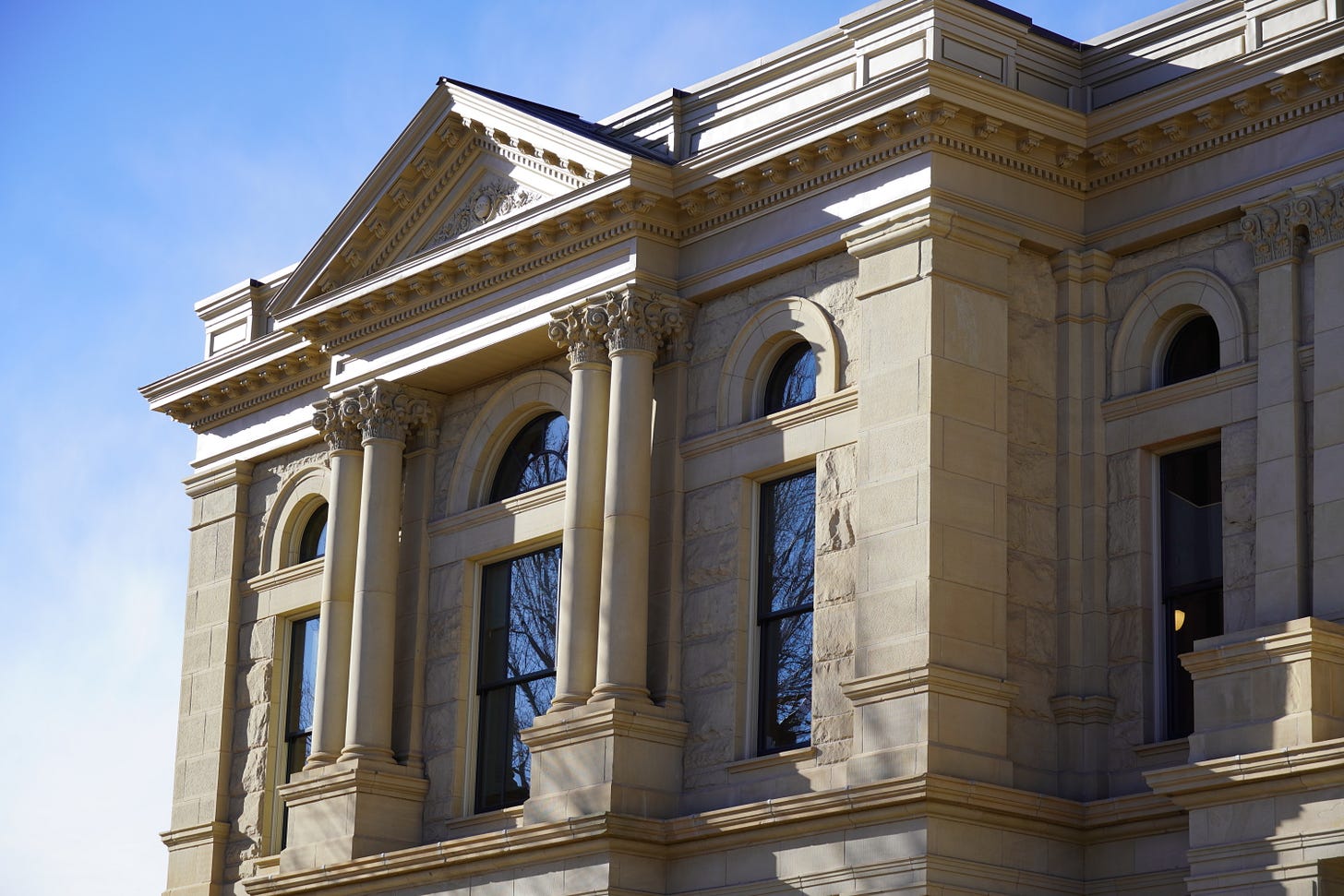“The point is cruelty”
Halfway through the 2025 session, state lawmakers have advanced seven of eight anti-trans bills out of their initial chamber. Transgender residents weigh fighting the bills or leaving the state.

At least seven proposed laws targeting the legal recognition and freedoms of the state’s transgender residents have escaped their chamber of origin, putting the Wyoming Legislature on track to pass more anti-trans legislation in a single year than it has in all years to date.
The wide-ranging slate of bills would ban transgender women and girls from women’s sports and block the University of Wyoming from playing any college that does otherwise. The bills would also kick transgender people out of the bathrooms they’ve been using for years, prohibit supervisors from requiring the use of preferred pronouns, and declare that sex and gender are one and the same.
The last of these would deny transgender Wyomingites full recognition under the law.
The all-out anti-trans push ushering these bills to passage will drive Artemis Langford from the state, the transgender University of Wyoming student told the Laramie Reporter.
“I don’t want to go, but if my state government doesn’t believe that I’m worth investing in or even considered as a human with the rights and privileges of being a citizen, how am I supposed to live here and be free?” she said. “I can’t stay in Wyoming anymore and after I graduate this coming May, for my safety and future, I will leave my beloved home. I plan to move somewhere else to a state that values my contributions to society and my life.”
By end of day Friday, seven of the eight anti-trans proposals put forward by lawmakers this session had cleared their chamber of origin. Four had cleared the House:
House Bill 32, the “What is a Woman Act,” which passed with a 50-9 vote on its third and final reading;
House Bill 60, “Student eligibility in sports-amendments,” which passed with a 51-6 vote;
House Bill 72, “Protecting women’s privacy in public spaces act,” which passed with a 52-8 vote;
House Bill 200, “Parent rights-amendments,” which passed with a 34-26 vote.

Another bill, a second sports ban from the same chamber, had passed out of the Labor and Appropriations committees with 7-1 and 6-1 votes respectively, and could pass the House this week:
House Bill 274, “Biological males in women’s sports.”
Also by end of day Friday, three anti-trans bills had cleared the Senate, each receiving a 27-3 vote on their third and final readings:
Senate File 44, “Fairness in sports-intercollegiate athletics;”
Senate File 62, “Restrooms in publicly funded schools-2;”
Senate File 77, “Compelled speech is not free speech.”

The House bills will now be vetted by the Senate, while the Senate files will be vetted by the House. So far no bill has been assigned to a committee in its second chamber.
Santi Murillo, a lifelong Wyomingite and transgender woman, said the bills reflect national talking points. She said most Wyomingites are not looking for legislation about who uses what restroom and what teams the state’s single-digit number of trans athletes play on.
“They’re not a solution to a problem; they’re about segregation, and it’s about erasing trans people,” Murillo said. “It’s about letting trans people know that your authenticity isn’t welcome. You’re not allowed to live in public spaces, you are not allowed to exist as you are. And it’s the cruelty that’s the point.”
‘It’s a terrible thing to beg for one’s life’
It’s not uncommon for young people to leave the state after high school or college — it’s actually less common for them to stay. But while limited job opportunities and the socially conservative culture can drive other UW alumni from the Equality State, Langford wasn’t planning to follow them until recently.
“I’ve once imagined myself working in Wyoming, having a spouse and a family, and living the rest of my life here — and in God’s own time, to have my bones laid in Wyoming soil,” she said. “However, everything I’ve received from the universe and from God has told me otherwise.”
Langford is religious and said she prays every day for God to bless Wyoming and its state legislators “with good health and wisdom” and for them to “be blessed to have the courage to do the right thing of giving mercy, compassion, and opening their hearts to others.”
She also makes a daily habit of checking in with the legislative churn.
While Langford has been involved with state politics — as a precinct committeewoman for the Albany County Democrats and recently as a state delegate to the Democratic National Convention — she hasn’t testified against any of the bills she’s so concerned about this year.
“It’s a terrible thing to beg for one’s life,” Langford said. “If I thought there was any use to testify in committee, to write, to call, or even to get on my knees and beg for mercy and compassion for my life and the lives of the trans and non-binary people that lived in Wyoming, I would. Unfortunately, those legislators wouldn’t bat an eye, because the point is cruelty.”

Advocates of this legislation might scoff at comments like “begging for one’s life” — but a comprehensive body of research shows this is not hyperbole. For some transgender Wyomingites, these bills are very much a matter of life and death.
There are no research papers specifically showing that pronoun bills like Senate File 77 or declarations like the “What is a Woman Act” threaten lives directly — but there’s ample research showing that acceptance of transgender youth leaves young people less depressed and even less suicidal.
For a young transgender or non-binary person, having people in their life who use their preferred pronouns or otherwise accept their gender identity can decrease how often they think about suicide.
Access to gender-affirming care also decreases the risk of suicide for transgender youth. The vast majority of those who want and receive this medical care live happier, healthier lives and report having better relationships.
Wyoming legislators outlawed that care last year. Doctors can now be stripped of their licenses for providing what is considered by every major medical and psychological association the highest standard of care for transgender youth.
Access to care is perhaps the most devastating loss for transgender Wyomingites. But the other restrictions and removals already passed and coming down the pike seek to further “dehumanize” trans folks, Langford said, making the state unlivable even for those who view themselves as “children of Wyoming.”
“Wyoming is going to lose a lot of valuable, creative, and hardworking people,” Langford said. “And it’s not just trans people that will leave. It’s every young person that believes that if their state government is so focused on the ‘culture war,’ then they should live in a place that they can have a job and a future.”
‘They’re not looking for a solution’
Other transgender residents plan to stay.
Santi Murillo, the communications coordinator for Wyoming Equality, said she still believes in “the promise of Wyoming,” which — in addition to sparsely populated open spaces — includes a limited government that doesn’t legislate bathroom use or rules for collegiate sports.
“My roots are here,” Murillo said. “I’m a true Wyoming gal. I love this state. I love the values that Wyoming once held. I think I value the Wyoming I once knew and loved. And I think I believe in my heart that we will get back there, that this is just a little ugly part of history that we unfortunately have to live through.”
As Wyoming lawmakers seek to pass more anti-trans laws than ever before, they have also perhaps heard from more transgender residents than ever before.
When bathroom bills, sports bans and the rest have appeared before committees, transgender and intersex residents have taken to the microphone, asking whether lawmakers really want to make transgender men use the women’s restroom or else sharing their experience of prejudice and stereotyping.

Murillo has spoken to multiple committees about her own history as a transgender athlete at the University of Wyoming. At least two of the bills on deck this session — HB60 and SF44 — could cost the next generation of trans athletes the opportunities UW gave Murillo.
“They really supported me,” Murillo said of an athletics department that just months ago saw its volleyball team forfeit two games against San José State over that team’s inclusion of a transgender member. “I had a very great transition experience. Especially as somebody who was transitioning very publicly, I had a very positive experience.”
It’s difficult to imagine a transgender athlete at UW having the same positive experience in 2025.
Murillo said Wyoming has lost the “live and let live” zeitgeist that colored her college years — but only temporarily. She’s confident it will return to Wyoming.
“I think this session isn’t truly reflecting the values of Wyoming,” Murillo said. “I think that a lot of the legislation we’re seeing is based on national talking points and national scare tactics regarding the trans community. I don’t believe that these are the Wyoming values that people uphold.”
Murillo’s argument — that the anti-trans push contradicts Wyoming’s core values — is a common point raised by Wyoming Equality and other advocates of transgender rights. But lawmakers have said their constituents want these anti-trans bills; sponsors for some of the bills have claimed their voters are more interested in passing these laws than they are in receiving property tax relief.
Murillo has been fighting anti-trans legislation in Wyoming for years now.
In 2022, she fought a sports ban that ultimately failed. In 2023, she fought its successor, which succeeded. In 2024, in addition to passing the gender-affirming care ban, lawmakers also passed a forced outting bill — requiring school districts to out gay and trans students, even to unsupportive families, in the name of “parental rights.”
The deluge of anti-trans legislation this year, Murillo said, continues the trend of chasing phantoms, proposing “solutions” to problems that do not exist.
“They’re not looking for a solution,” she said. “They’re looking to target an already marginalized group of people. In doing so, they’re dehumanizing trans people and turning us into monsters when they don’t realize that we’re just everyday Wyoming citizens.”
In addition to the wave of anti-trans legislation, the right-wing majority in Cheyenne is pursuing a broad agenda targeting undocumented immigrants, denying climate science, and making it easier for public education funding to go to private and religious charter schools.




"Proposing “solutions” to problems that do not exist" is the state motto of Wyoming and especially it's Freeloader legislators.
Excellent coverage, as always.
Your coverage of lgbtqia+ issues is second to none. Thank you for providing context and giving actual transgender Wyomingites a chance to be heard.